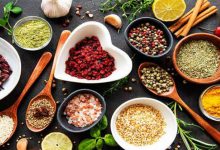What foods can help treat colds?
The common cold usually causes no appetite, but certain foods may help speed up the healing process. The nutrients needed to keep the body hydrated and speed up the healing process can be obtained by eating nutritious food and drinking plenty of fluids.
What foods can help treat colds?
According to medical research, the following foods can reduce the symptoms of a common cold:
1. Chicken soup:
Chicken soup can relieve nasal congestion, open up the airways, and relieve respiratory symptoms. Vegetable soup may also have similar effects. Soups are easy to digest and prepare, and because they contain water, they help strengthen and hydrate the body.
2. Garlic:
In moderation, garlic has antiviral and antimicrobial properties and can help the body’s immune system fight colds.
3. Foods containing vitamin C:
Fruits and vegetables provide vitamin C and support the immune system.
Some foods rich in vitamin C include:
- Bell pepper
- Orange juice
- Grapefruit
- Kiwi
Vitamin C-rich fruits and vegetables contain flavonoids, which have many health benefits and can also lower the risk of respiratory infections.
4. Ginger:
One of the foods recommended in traditional medicine for colds is ginger. Ginger aids digestion and facilitates gastric emptying so it can relieve any cold-related nausea. Ginger can be added to soups, stews, and other meals, or it can be added to herbal tea with honey and lemon and drank.
5. Vegetables:
Leafy vegetables are high in fiber, which helps digestion. In addition to vitamin C, iron and folic acid, it contains antibacterial and anti-inflammatory properties that help treat colds and strengthen the immune system.
6. Oatmeal:
Barley is a fantastic source of fiber probiotics that nourish the body with healthy bacteria, and when combined with bananas, it provides the body with potassium and is useful for treating fever, diarrhea and vomiting caused by colds.
7. Tasteless food:
Colds can cause nausea, so it’s best to eat foods that are low in the disease, such as toast and brown rice. Toast and brown rice along with soups and simple foods containing vegetables can provide a sufficient amount of vitamins and minerals for the body.
8. Yogurt:
Yogurt containing live bacteria can help fight colds and is also a good source of protein. Dairy may temporarily worsen the symptoms of the common cold in some people by increasing mucus production.
9. Consumption of fluids:
Keeping hydrated is one of the most important things a person can do to help fight the common cold.
Some useful fluids include:
The kidneys use water to remove waste products from the body. Drinking plenty of water can help you recover faster.
Coconut water contains potassium and sodium chloride. Coconut water is a good alternative to electrolytes lost through sweat, vomiting or diarrhea.
Honey, lemon, and ginger in hot water: This drink is perfect for preventing colds.
10. Onions and leeks:
The natural killer cells of invaders and the common cold virus are greatly assisted by these substances.
11. Honey:
In the case of a sore throat caused by a cold, honey is the best substance to treat it because of its antioxidant and antimicrobial properties, which help fight infections, viruses, bacteria and fungi.
12. Kefir:
Because it contains more protein than yogurt and milk, it is easier to digest and generally helps relieve cold symptoms and prevent them from getting worse. Kefir contains probiotics, which strengthen the immune system.
13. Selenium rich foods:
A sufficient amount of selenium in the body increases the production of cytokines, which in turn kills the common cold virus.
Some foods that are a source of selenium include:
- Nuts
- tuna fish
- Shell
- Mushrooms
Since fungi are rich in vitamin D, they have antiviral properties and help fight infections. Mushroom polysaccharides work to strengthen the immune system as well.
14. Carbohydrates:
Colds are caused by inflammatory responses and dysfunctional immune systems.
15. Fatty fish:
Salmon is rich in vitamin D, which helps strengthen the immune system and reduce the symptoms of colds.
16. Zinc-rich foods:
Zink is one of the most effective cold treatments. Studies have shown that taking zinc at the onset of a cold can shorten its duration by up to a day, and taking zinc pills on a daily basis can also reduce its severity. Zinc is found in pumpkins and peas.
17. Tomatoes:
Tomato soup is a good alternative to chicken soup if you are a vegetarian. Antioxidants in tomatoes reduce cold symptoms and speed up the recovery process.
18. Bitter Chocolate:
Chocolate contains an alkaloid called tobromine that helps reduce inflammation caused by colds.
19. Fennel:
The antiviral properties of fennel oil make it useful for treating colds, according to studies.
Some foods to avoid when you have a cold:
1. Hard foods:
Crisps and fried foods scratch the throat and aggravate it.
2. Processed foods:
These foods may contain a lot of salt, which dehydrates the body, as well as sugar, which increases inflammation.
3. Fatty and oily foods:
These foods are very slow to digest.
4. Dairy:
Lactose is a dairy compound that is hard to digest and can worsen nausea caused by a cold.


